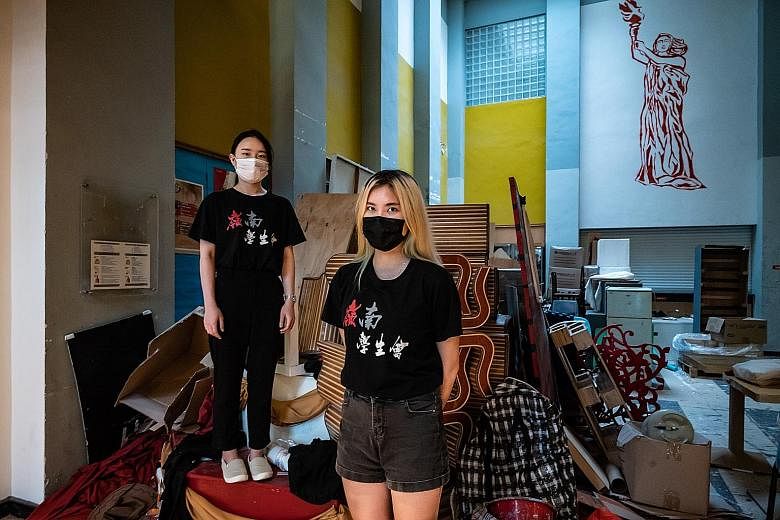HONG KONG • The police arrived at The University of Hong Kong at about 3pm, wearing black vests marking them as national security officers. They cordoned off the offices of the student union, combed its interior and seized several bins of material.
A top police official said they were investigating the union over comments from its leaders that the authorities said had glorified violence. But the underlying message of the raid in the middle of last month was clear: The authorities were clamping down on the city's universities, and in particular its student activists.
Students were among the most determined protesters during Hong Kong's mass demonstrations in recent years against the Communist Party of China's tightening grip, emerging as a potent political force.
Now, the authorities are moving to erode their influence, wielding a national security law imposed by Beijing that gives them sweeping powers to muzzle dissent.
School administrators have made it harder for student unions to collect dues on campus. Union leaders have been suspended for actions relating to pro-democracy protests.
Student groups - their ranks already diminished by fear and pressure from university administrators - are wondering how much longer they will exist.
"To tell the truth, it feels like we're just waiting to die," said Ms Yanny Chan, a union leader at Lingnan University, where the administration has said it would stop collecting membership fees on the group's behalf.
Outspoken and at times combative, the unions are longstanding pillars of Hong Kong's civil society. In 2014, student leaders helped kick-start months of pro-democracy protests by storming a downtown square; they later represented the protesters in negotiations with the government.
When protests exploded again in 2019, the unions helped organise a general strike and funded legal aid for arrested demonstrators.
The unions have also been training grounds for prominent opposition figures. Lingnan's union was once led by Nathan Law, who organised students to boycott classes in 2014 in a call for expanded voting rights.
Two years later, at 23, he was elected to the city's legislature as its youngest-ever member. He prefaced his oath of office with a protest against Beijing, saying he would never be loyal to a "regime that murders its own people". The government later disqualified and ousted him from the legislature; he now lives in exile in London.
The unions' prominence has stemmed in part from their willingness - like student activists around the world - to stake out divisive positions. They have at times been accused of encouraging discrimination against students from the Chinese mainland. Some split with moderate allies over issues such as Hong Kong independence as the idea, anathema to many older activists, gained favour with younger Hong Kongers.
"Student government always acts as a radical flank of the pro-democracy movement," said Mr Johnson Yeung, who led The Chinese University of Hong Kong's union in 2012 and 2013. "We don't always succeed, we don't always get popularity in our ideas, but we try to create new space."
Some of the most violent episodes of the 2019 protests were days-long sieges of two college campuses in November, when students lobbed homemade bombs and set barricades on fire, while the police fired tear gas and water cannon.
The unions' roles in those confrontations were often unclear. But for Beijing, the fiery stand-offs reinforced the view that universities, and by extension their student leaders, were some of the city's most dangerous sources of resistance.
At Lingnan, the union still offers counselling for students facing protest-related legal trouble. It has also continued with the more mundane tasks of student government, such as distributing dining vouchers and surveying students on the university's pandemic response.
But Ms Kitty Law, a first-year member, said the primary goal was showing that the group still existed.
"We can't really do anything," she said. "We just don't want to let this union disappear."
NYTIMES

